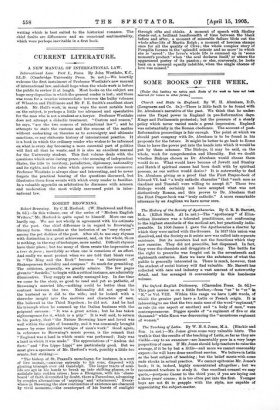Robert Browning. By C. H. Herford. (W. Blackwood and Sons.
2s. 6d.)—In this volume, one of the series of " Modern English Writers," Mr. Herford is quite equal to himself. More one can hardly say. We are not wholly in agreement with his estimate of the poet. Our chief difference is in regard to Browning's literary form. One smiles at the inclusion of an "easy rhyme" among the pet dislikes of the poet. After all, to use easy rhymes with distinction is a great achievement, and, on the whole, there is nothing, in the way of technique, more useful. Difficult rhymes have their place ; but too many of them create the impression of a tour de force ; inevitably so when one is conscious of an effort. And really we must protest when we are told that blank verse in " The Ring and the Book" becomes " an instrument of Shakespearean flexibility and compass." So much for grumbling. The criticism, generally, we greatly admire. The few pages given to " Sordello," to begin with a critical instance, are admirably illuminative. They supply an easily managed key. In due time we come to the story, so good to read and yet so pathetic, of Browning's married life,—nothing could be better than the contrast between the two. Nationality did not appeal to the husband as it did to the wife ; and he looked with a shrewder insight into the motives and characters of men. She believed in the Third Napoleon ; he did not. And he had his triumph when he summed up the Italian business with the poignant sarcasm : " It was a great action ; but he has taken eighteenpence for it, which is a pity." It is well said, to return to his poetry, that " the Nature Browning knew and loved was well within the sight of humanity, and it was commonly brought nearer by some intrinsic vestiges of man's work." Good again, in reference to Browning's music poems, is the remark that " England was a land in which music was performed ; Italy was a land in which it was made." The appreciations of " Andrea del Sarto " and " Fra Lippo Lippi" are particularly good. But we must give a specimen of Mr. Herford's work, possibly a little too ornate, but striking :— "The bishop of St. Praxed's monologue, for instance, is a sort of live mosaic,—anxious entreaty to his sons, diapered with gloating triumph over old Gandulph. The larger tracts of soul- life are apt in his hands to break up into shifting phases, or to nodulate into sudden crises ; here a Blougram, with his ' chess- board' of faith diversified by doubt, there a Paracelsus, advancing by complex alternations of 'aspiring' and attainment.' Every- where in Browning the slow continuities of existence are obscured by vivid moments,—the counterpart of his bursts of sunlight
through rifts and chinks. A moment of speech with Shelley stands out, a brilliant handbreadth of time between the blank before and after; a moment of miserable failure blots out the whole after-life of Martin Relph ; a moment of heroism stamps once for all the quality of Clive ; the whole complex story of Pompilia focuses in the splendid minute and no more' in which she is saved ' ; the lover's whole life is summed up in 'some moment's product' when 'the soul declares itself,' or utters the upgarnered poetry of its passion ; or else, conversely, he looks back on a moment equally indelible, when the single chance of love was missed."










































 Previous page
Previous page